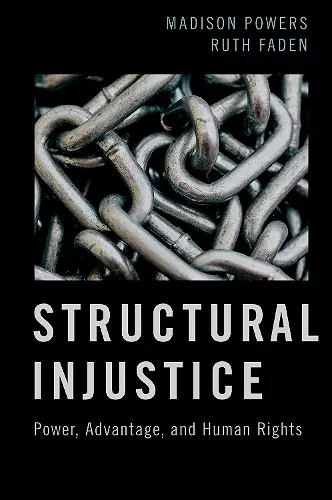Structural Injustice
Ruth Faden author Madison Powers author
Format:Paperback
Publisher:Oxford University Press Inc
Published:30th Nov '23
Should be back in stock very soon
This paperback is available in another edition too:
- Hardback£85.00(9780190053987)

Madison Powers and Ruth Faden here develop an innovative theory of structural injustice that links human rights norms and fairness norms. Norms of both kinds are grounded in an account of well-being. Their well-being account provides the foundation for human rights, explains the depth of unfairness of systematic patterns of disadvantage, and locates the unfairness of power relations in forms of control some groups have over the well-being of other groups. They explain how human rights violations and structurally unfair patterns of power and advantage are so often interconnected. Unlike theories of structural injustice tailored for largely benign social processes, Powers and Faden's theory addresses typical patterns of structural injustice-those in which the wrongful conduct of identifiable agents creates or sustains mutually reinforcing forms of injustice. These patterns exist both within nation-states and across national boundaries. However, this theory rejects the claim that for a structural theory to be broadly applicable both within and across national boundaries its central claims must be universally endorsable. Instead, Powers and Faden find support for their theory in examples of structural injustice around the world, and in the insights and perspectives of related social movements. Their theory also differs from approaches that make enhanced democratic decision-making or the global extension of republican institutions the centerpiece of proposed remedies. Instead, the theory focuses on justifiable forms of resistance in circumstances in which institutions are unwilling or unable to address pressing problems of injustice. The insights developed in Structural Injustice will interest not only scholars and students in a range of disciplines from political philosophy to feminist theory and environmental justice, but also activists and journalists engaged with issues of social justice.
a profound and fascinating essay on the structural injustices shaking our times... genuinely a philosophical essay. Yet one of its most significant merits is that it is written for various audiences, including researchers in bioethics and public health ethics, political philosophers, journalists, and activists. * Ryoa Chung, Hastings Center Report *
This is an urgently needed book. Madison Powers and Ruth Faden have constructed a powerfully reasoned, deeply learned, and richly perceptive theory that places the problem of structural injustice at the heart of political philosophy... The authors make conceptual breakthroughs that open new perspectives on old debates, and they write with authority and clarity on every issue they address. Their discussion is filled with wisdom and discernment, informed by a deep understanding of philosophical and social science literatures. I hope this book influences scholars, activists, policymakers, and the public at large; it should be widely studied and discussed, its arguments and insights put to productive use. * Jamie Mayerfeld, Ethics and International Affairs *
The notion of 'structural injustice' is now commonplace among academics and activists, but this book is rare in giving it a rigorous philosophical elucidation, tying it to human rights violations, unfair disadvantage, and unfair power relations. It is a book richly informed by contemporary philosophical debates, yet written in a clear and accessible style with plenty of references to real-world examples. And it is attentive to the global dimension of the structural injustices that disfigure the contemporary world. It is a model of what philosophy that is engaged with realworld problems can be. * John Tasioulas, University of Oxford *
ISBN: 9780197744895
Dimensions: 235mm x 157mm x 19mm
Weight: 544g
328 pages